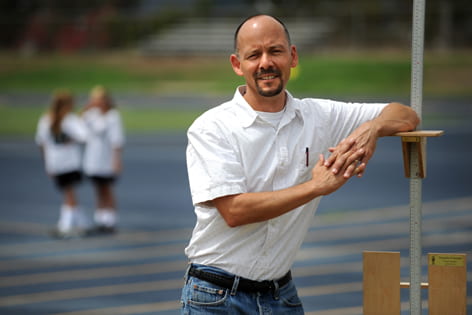Fighting poverty with knowledge
Inequality literally is making people sick, says Michael Montoya, UC Irvine anthropology and Chicano/Latino studies assistant professor.

Inequality literally is making people sick, says Michael Montoya, UC Irvine anthropology and Chicano/Latino studies assistant professor.
Montoya’s pioneering diabetes research shows that poverty, housing segregation and poor diet are stronger indicators of a person’s chance of developing the disease than simply race or ethnicity.
“Because much of the research on diabetes focuses on genes, researchers miss the more significant and alterable causes of diabetes,” Montoya says, referring to social and environmental factors rather than medical and hereditary causes.
Montoya founded the Community Knowledge Project in 2005 to combine university-level research with community action to address childhood obesity, diabetes, stress and overall community health in Orange County’s poorest neighborhoods.
Today, the grassroots organization is working on improving health standards for school lunch programs and developing and strengthening intramural athletic programs in low-income communities.
“Partnering with communities is not only necessary, it’s the only thing that will work in the long run to create lasting change,” Montoya says.
Shawn Wehan, a community organizer with the Orange County Congregation Community Organization, is working with Montoya and his team of researchers in Fullerton to improve the city’s parks and school lunch programs and develop anti-gang efforts. Recently, they obtained city funding to install overhead lights at a local park for evening soccer matches.
Wehan acknowledges that working for change can be a frustrating, but ultimately gratifying, process.
“None of this stuff happens overnight, but when you do get something accomplished it affects thousands of people and, for the most part, can be very lasting.”
Another project, led by Montoya and social ecology graduate student Erin Kent, has helped Fullerton’s St. Jude Medical Center gain a more realistic perspective on the health issues facing its low-income clients. Working with Barry Ross, the hospital’s healthy communities program vice president, the researchers talked with community members, and the results, says Ross, “reinforced the direction of our outreach programs and helped us better set our priorities in meeting their needs.”
Nick Juni, a senior biomedical engineering major, is working with Dr. Christina Schwindt at UC Irvine Medical Center to determine if patients’ demographic information – such as income level, education or home residence – can be helpful in explaining elevated rates of diseases, such as diabetes or asthma, in particular neighborhoods and population groups within Orange County.
Community involvement is nothing new for the community worker turned scholar. Montoya spent nearly a decade in the nonprofit world before completing his doctorate in anthropology at Stanford in 2003. During that time, he began making discoveries that inequalities literally cause poor health, further fueling his passion to bring attention to issues like hunger and housing.
He continues to study and have an impact on these areas in his multiple roles as social sciences professor, research director of the community engagement unit of the Institute for Clinical & Translational Science, and as a core faculty member in the Program in Medical Education for the Latino Community. He also holds an appointment in UCI’s program in public health.
Montoya’s work has earned him the UCI Community Outreach Partnership Center’s inaugural Engaged Scholar Award, recognizing his efforts to turn healthcare-related research into real-world applications.
